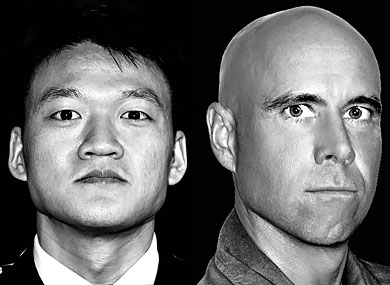What do the two top anti-DADT activist do now that the bill has been repealed and all branches of the military will have every inch of the military trained on the repeal of the ‘Don’t Ask, Don’t Tell’ military policy against gays serving openly. In a statement given to Advocate magazine, Choi and Fehrenbach both are living now by a new motto: “Life Goes On”.
According to the Navy, this training will be fully completed by June 30th. Each branch is required to train their personnel in three top-down intervals: first military chaplains, lawyers, and civilian public affairs officers, then commanding officers, and finally rank and file troops. April 30 is the goal date to finish commander training, and then rank-and-file sailors should be done with their training by June 30.
Because President Barack Obama, Defense secretary Robert M. Gates, and Joint Chiefs of Staff chairman, Adm. Mike Mullen must certify that all members of each branch in the military have been sufficiently trained before the ban is officially lifted, the earliest that full implementation could happen would be September.
Aubrey Sarvis, executive director of the Service Members Legal Defense Network.
The Washington Post reports that leaders from each branch had to submit their training plans to the Pentagon, but the Navy made their plans public. Still, we all take baby steps to reach that victory line and in the meantime, former service members and anti-DADT activists share with us what they plan to do now?
Dan Choi:
I’m going to try and finish my master’s degree at Harvard University, perhaps in some type of political or public policy field. The key lesson I learned in this journey is that you cannot limit yourself to traditional directions or methods, so my plans must remain flexible. I just joined the Gay Men’s Chorus in Boston — I’m excited to be a full part of the community. I also plan to focus more time on issues like homeless youth, post-traumatic stress disorder awareness, and the full civil rights movement. DADT repeal has served many of us well as an introductory course.
Victor Fehrenbach:
“I’d love to continue to work for LGBT equal rights and stay involved with advocacy, especially fighting for marriage rights and helping gay youth. All of our issues are interrelated. DADT repeal will affect, even accelerate, the issues of adoption and marriage equality, among others. But most importantly, it will affect gay youth. After the rash of teen suicides, we told gay teens ‘it gets better,’ but the reality was that persecution continued into adulthood — they could still get thrown out of the military, be fired from jobs, and some couldn’t get married or raise a family. DADT repeal was just the beginning — it was the first major step to advancing acceptance. Most importantly, it was the first sign to young gays that it truly does get better.”
Victor Fehrenbach












